After our international activity ‘D-e-zign it!’, our Vice-President Tilo Podstatny and our EVS volunteer Marion Bonnouvrier had the opportunity to join the UNITED network conference “Living Together: Transform a divided past into our common future” near Ohrid, FYR Macedonia. Focusing on the topic of national reconciliation and post-conflict peace building, the conference was organized to offer participants the opportunity to learn about and discuss the topic, exchange ideas and best practices, and to network with activists from all over Europe.
What causes conflicts between people and nations? How can these conflicts be resolved? What measures can be taken to ensure that communities recover from past conflicts? What can civil society organizations do to help communities to live together? These are the questions that were tackled by 75 activists.
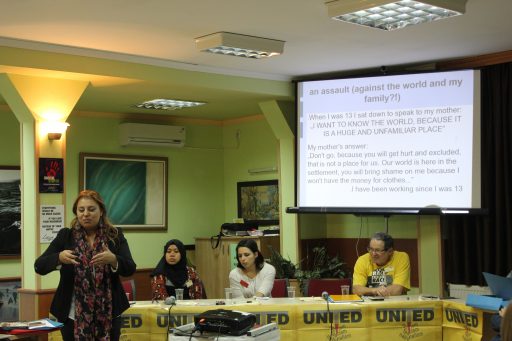
“Tell Us Your Story”, Ilona Notar of Romana Kris – Roma Organisation
The conference started with participants introducing themselves by telling shortly the rest of the group about what they stand for. This was followed by opening remarks of a panel of experts from Macedonia and Bosnia-Herzegovina; Boshko Stankovski of Center for Intercultural Dialogue (CID) talked about the basis of the reconciliation process and the dilemma between reconciliation and justice. “Peace-building is the tricky part, because the peace must be sustainable.”
Besnik Emini from the European Association of History Educators spoke about the role of history in the reconciliation process. “Our education system is currently built to work with an authorial system, and doesn’t take into account the diversity of different abilities.”
The session was closed by Majda Behrem-Stojanov and Edita Colo Zahirovic of Catholic Relief Services in Bosnia and Herzegovina, who emphasized the problem of educational segregation and talked about the concrete peace process that took place in Bosnia and Herzegovina after the war. “The Chinese word for conflict means both danger and opportunity. Conflict can be viewed in the same way. We need to transform a culture of war into a culture of peace.”
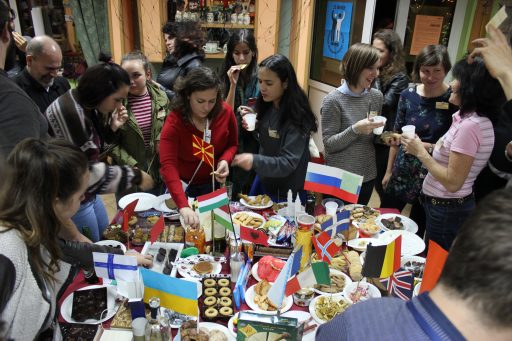
Intercultural evening
Besides the plenary sessions, participants had the opportunity to share experiences and best practices in discussion groups. The first working group session was about the Danger of Words. Participants looked at a variety of different example of hate speech and analyzed how words can be damaging when misused. During the first evening, participants shared and tried different international snacks and drinks they brought from all over Europe, after they took part in a speed-networking activity where they got to know more about each other’s organization.
On day III, participants learned from different historical conflict following World War II, respectively in Macedonia, Bosnia-Herzegovina, Cyprus, and across Europe in general. They also had the opportunity to focus on useful and practical tools in reconciliation work.
Following Gubaz Koberidze, group member of No Hate Speech Movement that shared different online tools that participants can use within their organization, our EVS Marion Bonnouvrier ran a session about how to create efficient visuals for a successful campaign, with tools and tips about the do’s and don’ts in the design world, showing concrete examples. This was followed by a plenary session in which Jonathan Karstadt from UNITED gave an overview of the annual campaigns, including the UNITED Against Refugee Deaths campaign and the List that UNITED has been collecting since 1992 to document the thousands of migrants and refugees who died due to European border policies.
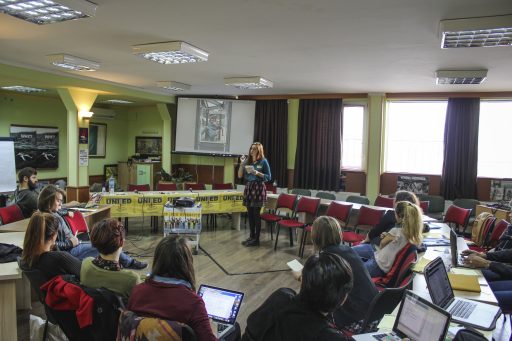
Online campaigns session – ”How to create efficient visuals”
The last session, “Tell Us Your Story”, where participants shared personal testimonies and stories was particularly captivating and poignant. One of the story was about Ilona Notar of Romana Kris – Roma Organisation, that talked about her experience of discrimination growing up in a segregated Roma community in Hungary. “During my school years the teachers separated me from the rest of the class and put a G next to my name, which stands for Gypsy.” You can have a look on 5 different testimonies in a report of UNITED here.
On October 29, participants started working on the creation of a manual on reconciliation for civil society organizations. Five working groups were set up, each focusing on a specific topic: research, building up relations, education, selling it to the public, justice. Our vice president Tilo Podstatny was facilitating a session about “Getting in touch during the reconciliation process”.
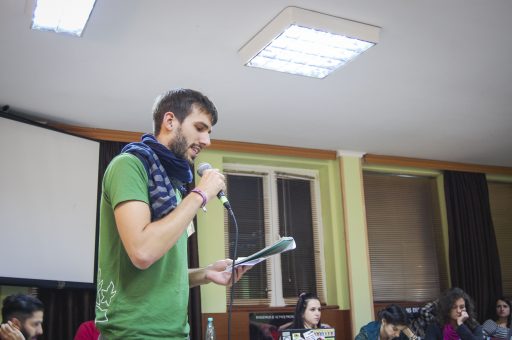
Tilo Podstatny reporting outcomes of his session “Getting in touch during the reconciliation process”
During the afternoon, participants had the chance to meet local NGOs in order to learn more about their work. Afterward, they had a free afternoon in the beautiful town of Ohrid.
Last day opened with a panel on hate crime reporting mechanism and data collecting by two experts from OSCE Office for Democratic Institutions and Human Rights (ODIHR), Francois Deleu and Serena Pescatore.
During the intercultural evening and farewell party, there were various artistic performances from a number of talented participants who sang, recited poems and showed traditional dances!
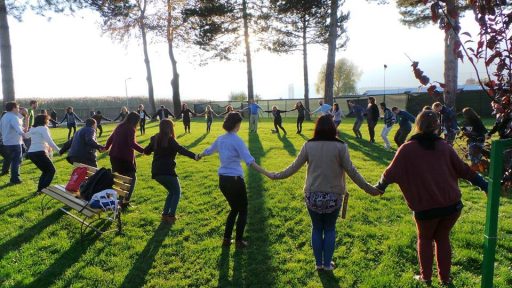
Photo credits: Umit Ozturk
“UNITED conference sent a powerful message of unification that brought together humanity in a way that is not a one world tyranny. Inspiring and engaged people with purposeful experiences made me think outside the box. No one is born prejudiced! Prejudice is learned and can be unlearned. Progressive change require mass mobilisation, and we should dedicate all our efforts in building peaceful coexistence between communities and nations in which people regardless their religion, gender, sexual orientation or residence status will prosper and benefit full access to their rights.” Marion Bonnouvrier
